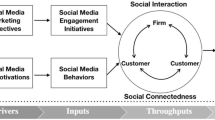Abstract
The article “An Empirical Investigation of a General Theory of Marketing Ethics” by Mayo and Marks constitutes a major effort at testing the theory of marketing ethics developed by Scott Vitell and me (1986). Mayo and Marks (hereafter, “M&M”) deduce several key research hypotheses from the theory, test those hypotheses using a marketing research scenario, and conclude: “The core relationships in Hunt and Vitell’s model appear to capture much of the decision-making processes that marketing managers employ in resolving an ethical dilemma.” Although no single empirical study ever provides a definitive test of a theory, their encouraging findings will likely prompt further empirical studies. The objective of this commentary is not to criticize the design of M&M’s research, for there is no such thing as a perfect research design. All efforts to test empirically a theory will necessarily involve significant amounts of interpretive creativity and there are always trade-offs to be made. Rather, the objective here is to (1) review certain exemplary aspects of the M&M research design, (2) suggest some alternative interpretations and procedures for future researchers in this area to consider, and (3) show how some of the issues in their article relate to more fundamental philosophy of science concerns.
Similar content being viewed by others
References
Bergman, Gustav. 1957.Philosophy and Science. Madison: The University of Wisconsin.
Feyerabend, Paul K. 1978.Science in a Free Society. London: Verso.
Hunt, Shelby D. 1983. “General Theories and the Fundamental Explananda of Marketing.”Journal of Marketing 47 (Fall): 9–17.
— 1989. “Naturalistic, Humanistic, and Interpretive Inquiry: Challenges and Ultimate Potential.” In:Interpretive Consumer Research, Elizabeth C. Hirschman, ed., Provo, UT: Association for Consumer Research, pp. 185–198.
Hunt, Shelby D. and Scott J. Vitell. 1986. “A General Theory of Marketing Ethics.”Journal of Macromarketing 6 (Spring): 5–16.
Kohlberg, Lawrence. 1981.The Philosophy of Moral Development. New York: Harper and Row.
Laczniak, Gene. 1983. “Frameworks for Analyzing Marketing Ethics.”Journal of Macromarketing 3 (Spring): 7–18.
Peter, J. Paul and Jerry C. Olson. 1983. “Is Science Marketing?”Journal of Marketing 47 (Fall): 111–125.
— 1989. “The Relativist/Constructionist Perspective on Scientific Knowledge and Consumer Research.” In:Interpretive Consumer Research, Elizabeth C. Hirschman, ed.. Provo, UT: Association for Consumer Research, pp. 24–28.
Rest, James R. 1986.Moral Development: Advances in Research and Theory. New York: Praeger.
Author information
Authors and Affiliations
Rights and permissions
About this article
Cite this article
Hunt, S. Commentary on an empirical investigation of a general theory of marketing ethics. JAMS 18, 173–177 (1990). https://doi.org/10.1007/BF02726433
Issue Date:
DOI: https://doi.org/10.1007/BF02726433




